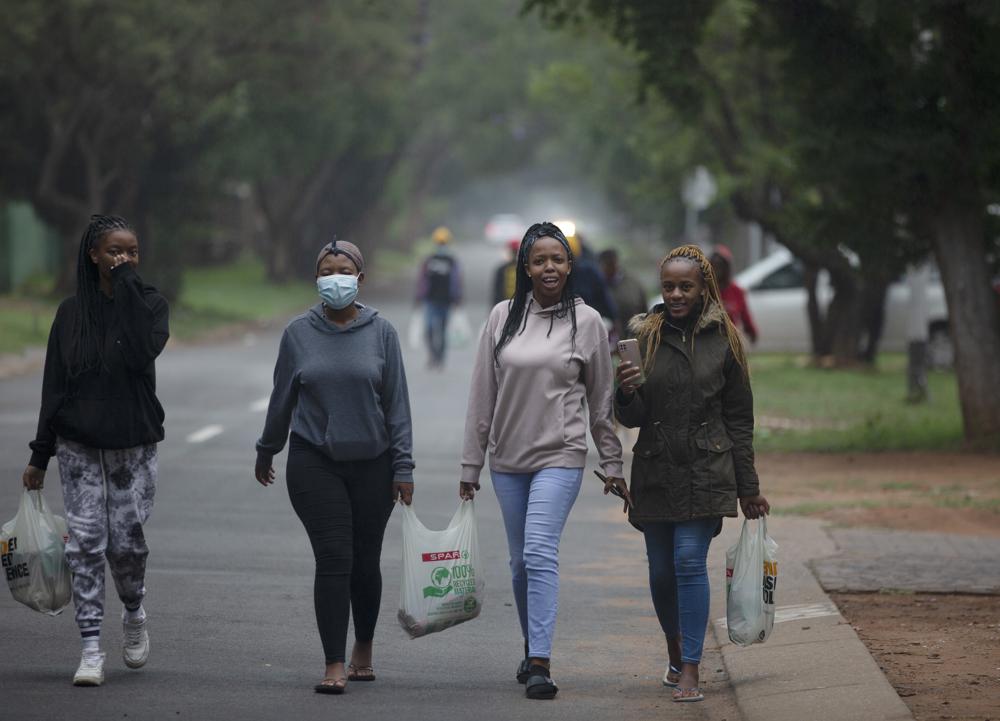Students from the Tshwane University of Technology make their way back to their residence in Pretoria, South Africa, Saturday, Nov. 27, 2021. As the world grapples with the emergence of the new variant of COVID-19, scientists in South Africa — where omicron was first identified — are scrambling to combat its spread across the country. (AP Photo/Denis Farrell)
JOHANNESBURG (AP) — Worried scientists in South Africa are scrambling to combat the lightning spread across the country of the new and highly transmissible omicron COVID-19 variant as the world grapples with its emergence.
In the space of two weeks, the omicron variant has sent South Africa from a period of low transmission to rapid growth of new confirmed cases. The country’s numbers are still relatively low, with 2,828 new confirmed cases recorded Friday, but omicron’s speed in infecting young South Africans has alarmed health professionals.
“We’re seeing a marked change in the demographic profile of patients with COVID-19,” Rudo Mathivha, head of the intensive care unit at Soweto’s Baragwanath Hospital, told an online press briefing.
“Young people, in their 20s to just over their late 30s, are coming in with moderate to severe disease, some needing intensive care. About 65% are not vaccinated and most of the rest are only half-vaccinated,” said Mathivha. “I’m worried that as the numbers go up, the public health care facilities will become overwhelmed.”
She said urgent preparations are needed to enable public hospitals to cope with a potential large influx of patients needing intensive care.
“We know we have a new variant,” said Mathivha. “The worst case scenario is that it hits us like delta … we need to have critical care beds ready.”
What looked like a cluster infection among some university students in Pretoria ballooned into hundreds of new cases and then thousands, first in the capital city and then to nearby Johannesburg, South Africa’s largest city.
Studying the surge, scientists identified the new variant that diagnostic tests indicate is likely responsible for as many as 90% of the new cases, according to South Africa’s health officials. Early studies show that it has a reproduction rate of 2 — meaning that every person infected by it is likely to spread it to two other people.
The new variant has a high number of mutations that appear to make it more transmissible and help it evade immune responses. The World Health Organization looked at the data on Friday and named the variant omicron, under its system of using Greek letters, calling it a highly transmissible variant of concern.
“It’s a huge concern. We all are terribly concerned about this virus,” Professor Willem Hanekom, director of the Africa Health Research Institute, told The Associated Press.
“This variant is mostly in Gauteng province, the Johannesburg area of South Africa. But we’ve got clues from diagnostic tests … that suggest that this variant is already all over South Africa,” said Hanekom, who is also co-chair of the South African COVID Variant Research Consortium.
“The scientific reaction from within South Africa is that we need to learn as much as soon as possible. We know precious little,” he said. “For example, we do not know how virulent this virus is, which means how bad is this disease that it causes?”
A key factor is vaccination. The new variant appears to be spreading most quickly among those who are unvaccinated. Currently, only about 40% of adult South Africans are vaccinated, and the number is much lower among those in the 20 to 40-year-old age group.
South Africa has nearly 20 million doses of vaccines — made by Pfizer and Johnson & Johnson — but the numbers of people getting vaccines is about 120,000 per day, far below the government’s target of 300,000 per day.
As scientists try to learn more about omicron, the people of South Africa can take measures to protect themselves against it, said Hanekom.
“This is a unique opportunity. There’s still time for people who did not get vaccinated to go and get the vaccine, and that will provide some protection, we believe, against this infection, especially protection against severe infection, severe disease and death,” he said. “So I would call on people to vaccinate if they can.”
Mogomotsi Magome contributed to this report.
Copyright 2021 Associated Press. All rights reserved.







































